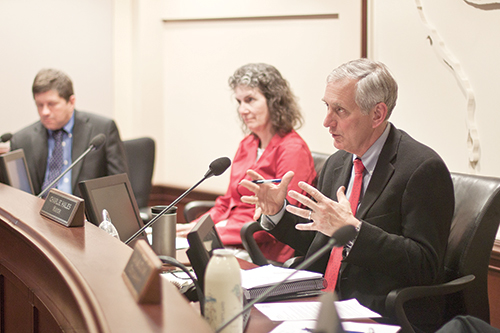Facing a money shortage “unlike anything we’ve seen in a very long time,” Portland Mayor Charlie Hales came to an agreement with the Multnomah Board of County Commissioners to save several key programs shortly before a Thursday city budget meeting.
Last-minute agreement saves SUN Program, needle exchange

Facing a money shortage “unlike anything we’ve seen in a very long time,” Portland Mayor Charlie Hales came to an agreement with the Multnomah Board of County Commissioners to save several key programs shortly before a Thursday city budget meeting.
Using county funds, they were able to save a syringe exchange at local charity Outside In, a crisis intervention center, and the Schools Uniting Neighborhoods. Community Schools programs, which provide a variety of services to school-aged children and their families, among other programs.
The programs, while not directly aimed at the Portland State community, impact quality of life for many who work and study on campus.
The needle exchange program, the only one of its kind in the city, has been active for more than 20 years. The service takes in more than half a million dirty syringes annually and exchanges them for clean ones, preventing the spread of HIV and other infections.
Thomas Aschenbrener, the former president of the Northwest Health Foundation, believes that the public health benefits of the program make it vital to everyone in the city.
“You may think that needle exchange is about ‘other kinds of people,’ but it’s not,” Aschenbrener said.
The county also agreed to cover the operating costs of the SUN program. The SUN network of schools works with parents and children to help youth in crisis, with special programs targeting lesbian, gay, bisexual and transgender youth and students struggling with addiction. It also provides vital after-school care and tutoring services, said Jenni Seven, a child care and lactation specialist with Portland State’s Resource Center for Students with Children.
“[A lot of parents] want to take summer classes, but can’t afford child care,” Seven said. “It delays their education.”
Services like SUN “help both the parents and the children be better contributors to society” by allowing parents to attend classes after primary schools let out, she explained.
One program not retained (barring another deal) is Janus Youth Programs. Janus funds three counselors to help sexually trafficked youth escape a life of prostitution. It also funds a shelter, Athena House, for sexually trafficked minors.
Over the course of roughly half an hour, more than a dozen advocates for Janus and a number of other services for sexually trafficked people spoke passionately about the work they have done. When describing the impact of the cuts, they didn’t mince words.
“Severely crippled,” said one social worker about their effort to take victims off the street.
“Absolutely catastrophic,” Janus worker Amy Baker said of the proposed slashes to their funding.
The string of concerns stood in stark contrast to earlier proceedings, in which citizens who intended to speak on behalf of programs that were saved thanked the City Council.




